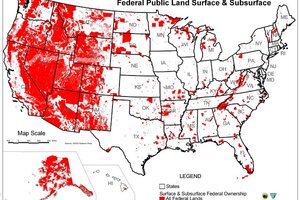Nevada range war: Western states move to take over federal land
The fight over Nevada rancher Cliven Bundy’s cows grazing illegally on federal land is a symbol of a much larger issue: control of land in western states, where the federal government is dominant.

Rancher Cliven Bundy speaks at a protest camp near Bunkerville, Nev. Friday.
John Locher/Las Vegas Review-Journal/AP
Like a mustang tied to a fence post, many westerners for years have resisted Uncle Sam’s control of land they say more properly belongs to states or counties – or to nobody at all except the ranchers, miners, and loggers who work the land for its natural resources.
The tussle over Cliven Bundy’s 400 cows – grazing on federal land, although he refuses to pay the required fees now amounting to more than $1 million – sharpens this debate, which has featured state legislators, county officials, environmentalists, and federal judges (all of whom have ruled against Mr. Bundy).
In Salt Lake City Friday, representatives from Utah, Idaho, New Mexico, Arizona, Nevada, Wyoming, Oregon, and Washington met for a “Legislative Summit on the Transfer of Public Lands.”
"Those of us who live in the rural areas know how to take care of lands," Montana state Sen. Jennifer Fielder said at a news conference. "We have to start managing these lands. It's the right thing to do for our people, for our environment, for our economy and for our freedoms."
In other words, today’s revival of the “Sagebrush Rebellion” is as much about political philosophy as it is about great stretches of the largely-arid territory west of the 100th meridian splitting the Dakotas and running down through Texas.
There’s a modern tea party political element to it, but it goes much farther back to when many western territories achieved statehood in the 19th century, working out deals with Washington (as Mormon Utah did over what adherents at the time called “plural marriages”).
The map accompanying this article shows the difference between the West and the rest of the country. Here’s a list showing percentages of federal land by state, according to the Congressional Research Service. It includes the US Bureau of Land Management, the US Forest Service, National Parks, and military bases: Nevada 81, Alaska 62, Utah 67, Oregon 53, Idaho 62, Arizona 42, California 48, Wyoming 48, New Mexico 35, Colorado 36.
State lawmakers say they’re better prepared to manage such lands, both for the environment and for regional economies.
"There is a distinct difference in the way federal agencies are managing the federal lands today," Sen. Fielder said. "They used to do a good job, but they are hamstrung now with conflicting policies, politicized science, and an extreme financial crisis at the national level. It makes it impossible for these federal agencies to manage the lands responsibly anymore."
Utah has led a legislative charge to demand relinquishment of title to certain lands that exclude national parks and wilderness study areas, reports the Deseret News in Salt Lake City.
The “Transfer of Public Lands Act,” signed into law by Utah Gov. Gary Herbert in 2012, set the stage for a formal showdown with the government by demanding action under threat of lawsuit, the newspaper reports. Other states are exploring similar options.
Often, the political fight centers on some hapless species of plant or animal threatened with extinction and protected under federal law – like the northern spotted owl in Oregon or the desert tortoise in California, Nevada, Arizona, and Utah. Sometimes federal agencies are caught in the middle, trying to apply the “multiple use” doctrine to lands in dispute.
A group of environmental groups recently filed a notice of intent to sue the BLM for failing to report impacts to the desert tortoise and similarly threatened and endangered species from off-road vehicles, cattle grazing and other activities in California.
“BLM says it’s committed to conserving species and habitats in California deserts – yet it has failed to comply with even the most basic requirements for management of desert tortoises and other rare and vulnerable wildlife,” Lisa Belenky, a senior attorney at the Center for Biological Diversity, said in a statement.
A potentially dangerous confrontation was averted last week when the BLM stopped rounding up Cliven Bundy’s cattle, which had been described as “trespassing” on federal land. Hundreds of Bundy supporters had gathered, many of them armed with assault-style rifles and other weapons.
The BLM vows to continue its action against Bundy in the courts, where it has won every decision so far.
But this dispute over a few hundred cows is an important symbol of a much larger issue that’s been part of US western history since wagon trains brought settlers west along the Oregon Trail.
"What’s happened in Nevada is really just a symptom of a much larger problem," Utah House Speaker Becky Lockhart said at the public lands summit.

